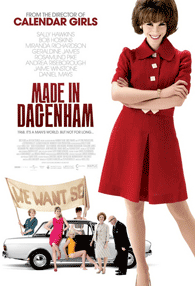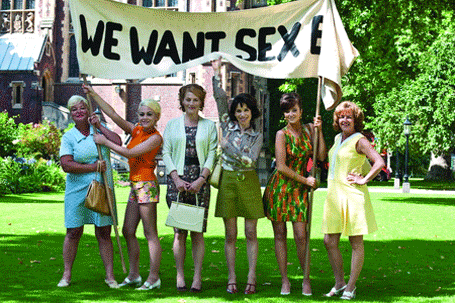
At times, Made in Dagenham feels like the first instance of a great English Midlands genre film. The period piece focuses on the late 1960s just before the triumph of women’s lib in the industrial age – the legalisation of equal pay – and recounts a key industrial strike that led directly to that victory. This subject matter would normally be turgid, uninspiring, and somnolence-inducing (like say any of the NTUC* labour movement musicals and plays from the previous years) but the film is thankfully powered by the British talent for wit and self-deprecation.
As a comedy, the film largely rests on the performance of Sally Hawkins as an unassuming, self-doubting, accidental leader of the women in the Ford factory at Dagenham. She finds herself leading their industrial action when the Ford headquarters, convinced that no one in the unions would stand up for the women, decide that the ladies should take a drastic pay cut. The supporting cast adds to the genial charm of your average British aunties and grandmothers who can be counted to do the right thing just when no one counts on it.
It is almost shocking that what follows is not dramatic denunciations, shrill quotations of Karl Marx, but general hilarity as gender politics (this was the beginning of the sexual revolution after all!) gets mixed up with labour union politics. It’s perhaps even more shocking and comic that judging from the film’s depiction of unions, workers, corporations, and politicians – nothing much has really changed in how things work since those ‘bad old days’, despite the obvious victory by the end credits.
Made in Dagenham is cheeky fun when it’s funny and highly convincing when it’s polemical, making this the best labour union comedy that the NTUC should have sponsored for a Labour Day celebration but somehow didn’t.
*NTUC (The National Trades Union Congress) is the Labour Movement of Singapore, set up in 1961.

